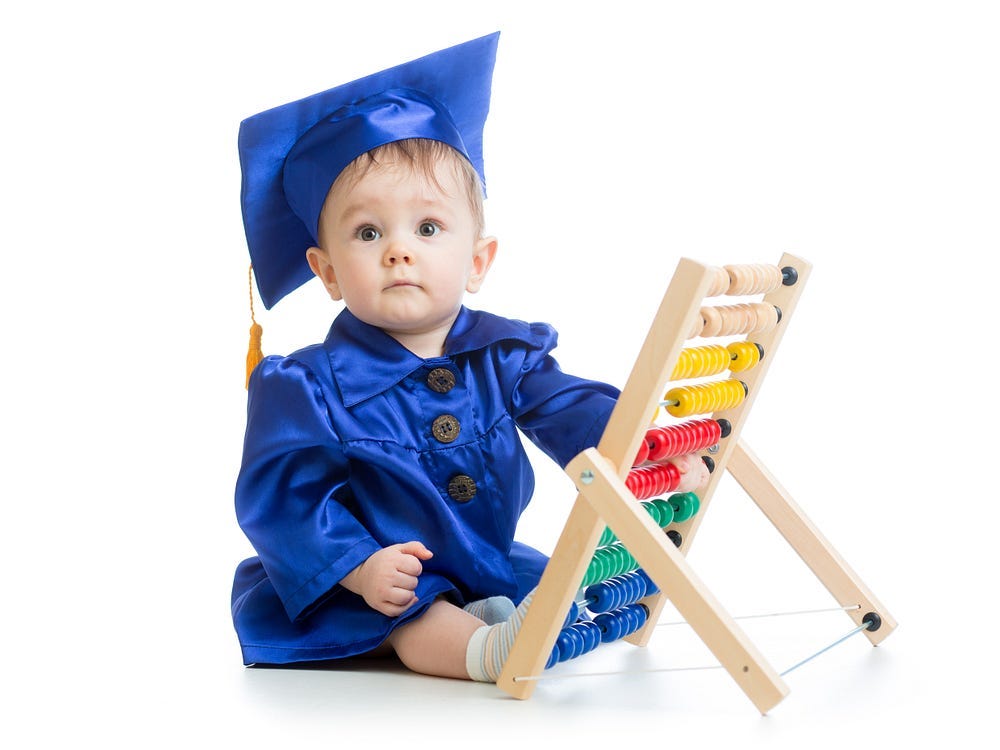Correcting Brain Myths (4): Early Achievement is Best for Children’s Brains

So, who wouldn’t want to get the most out of their child’s brain — who wouldn’t want to have little child prodigy? In fact, this desire is so strong it’s considered a multi-million dollar industry in the US. The only problem is that most of these ideas are junk.
Einstein didn’t spend his early years in early learning classes practising mathematics and learning three foreign languages before the age of 5. In fact, he did what most kids did at that time — stay at home playing with a few toys (not educational ones) and didn’t start school until 6, as was, and still is, usual in Germany — and even there had troubles initially.
That is insightful for what is considered, rightly, or wrongly, one of the greatest minds of the 20th Century.
Research is showing what conditions the brain needs for optimal development and learning — and it isn’t a lot of what is sold to you…and most of it is free and easy!
So, let’s look at some of these things and what they can do for your child’s brain — then we have to have a little, and honest, look at ourselves the parents.
The (free) dirty little secret to massively improving your kids’ cognitive abilities
Early achievement has been a thing for many years now. Get your kids into language classes for early years, get the musical instrument out, and get them into tennis classes as soon as they can walk. And then put them into a childcare with educational learning strategies. That should give you a child prodigy. Well, no, actually it won’t — and it could even make your kid dumber, lose cognitive flexibility, and many other important skills such as creativity. Your kid’s brain develops at a given pace, but that pace is also different in different kids.
In fact it is the single and simplest way to build multiple cognitive skills that will leave your kid with a better brain
There are some things that can be good. Early exposure to multiple languages is certainly positive. Sure, music is good, but it should be fun and unforced — obviously exercise is also good but drop the serious tennis lessons until a little later. There is one thing that will boost almost all aspects of your child’s brain.
It is simple — play. Yes, play and unstructured play at that. There is a time and place for structured play also, be that simply hide and seek or various card and board games.
Just how does play help your child’s brain to develop?
Well here’s is a list:
Creativity — finding novel solutions, imagination
Schema building — how the world works
Imagination — building complex alternative worlds
Theory of mind — how other people think
Problem solving — finding solutions to problems (often in novel ways — see creativity / lateral thinking)
Lateral thinking — thinking around corners and finding novel solutions
Counterfactual thinking — using facts and imagination and combining these in interesting ways
Social competence — when with friends listening and forming mutual plans
Linguistic skills — using a range of vocabulary (but also inventing new languages)
Powers of expression / explanation — having to express yourself and explain why you want to do what you want to do
Emotional regulation — through role playing / taking others needs into account
Mathematical skills — though using real world counting and numerical problems
Risk management — through interpreting risky situations and what is suitable or not
Attention — kids who are allowed unstructured play for 10–20 minutes can concentrate much better afterwards. This is much more effective, notably, than doing a sports programme for the same amount of time!
Calmness when older — animal studies show that when youngsters are allowed plenty of time to play, they are calmer as adults
Brain growth — animal studies have shown that play produces growth hormones and that are critical for brain growth. Play is essentially fertiliser for brain growth. This on top of all the above cognitive skills that are developed as part of play!
That is along list of very good things! This means that play, particularly unstructured play, is not just good, but essential to building healthy smart kids. In fact it is the single and simplest way to build multiple cognitive skills that will leave your kid with a better brain. It may be counter-intuitive, but there are heaps of scientifically significant studies that say this is what your kids should be doing. Yes, obviously structured activities, are also good, and I’m not saying your kids should have unstructured play all the time, but do make sure you give your kids plenty of time to simply play with no stress or structure around it.
Small secret tip: it won’t harm you, and may well give your brain a healthy boost, if you play also!

Getting bored
Another interesting aspect of parenting, and related to unstructured play, is that of getting bored. We as parents seem to be hyper worried that our kids will get bored and spend all sorts of time giving them stimulus or plonking them in front of television or an iPad to give them something to do and give ourselves a rest.
I know, I confess, I have done this many times myself. But getting bored is a natural part of life — don’t worry about it. Let your kids get bored because their brain will sooner or later (often sooner than you think) find a way out of it and start finding creative solutions to entertain themselves.
The big technology question!

I won’t go into the burning question on many parents’ minds in much detail — that of technology and social media. That is worth a separate post, or two, or three (and the research is still coming in — it’s not all bad either).
But two things are clear
Technology and social media are an important part of the world around us and of youngsters’ (particularly teenagers’) lives,
Kids are actually happier and have lower stress without social media.
So a difficult balance to strike. The simple tips are:
Use technology sparingly in younger years but they should also have access to it
Make sure your kids have plenty of time for structured and unstructured play with themselves, yourselves, and others
Give reasonable limits on technology use
Plan time for play or family time when your kids are older
Set technology free times / zones
Set a good example yourself!
Over parenting
Now we need to get into what may be, for some, uncomfortable truths. Parenting — for you the parents (I presume there are many parents reading this, if not something to remember for when, or in case, you become a parent).
Are you following your kid’s exact steps, every piece of homework, every grade, accompany them to their multiple activities, and plan their future as best you can?
You are then over parenting. Sometimes called helicopter parenting, or more recently, snowplough parenting: being involved in every aspect of your child’s life and helping and managing through this. Over-parenting has multiple negative impacts on children backed up by scientific studies such as:
Lower independence
Lower decision-making abilities
Lower coping skills
Increased anxiety
Increased depression in later life
Lower self-esteem
Harder time finding employment
Children need space and freedom and a safe base (home and parents). Let them explore, and encourage independence. Let them fall, pick them up, brush their knee (without fuss), and send them on their way again. This will help them develop as individuals and help their brains to develop the true independence, problem-solving, and coping skills they will need later in life.
But what about school
What about your children at school? Should you be following their grades and homework and sitting down with them every day to check that they have done what they should. No, you shouldn’t. You should obviously care about what they are doing but encouraging independence is a more critical life skill. You may have to give some children more support and more time to develop this independence, but independence should be your goal.
Rather than telling them when to do homework ask them how they can make sure they get their homework done.
If their grades are not up to scratch, ask them how they can improve them and how you can help.
But always remember that independent self-management is what you would like to achieve — it will be better for your children and make your life a lot easier also!
Your child isn’t a genius!
Yes, we all kind of want our children to be special, but remember also this could be us transferring our own wishes and our own lack of self-esteem onto our children. The term genius is overloaded anyway — it’s a bad word and I avoid it even for people like Einstein.
But we do want smart kids, with heaps of common sense, who can lead enriched adult lives — and to do that you will need to enable your children to develop effectively without stressing them.
Let them play, let them enjoy childhood, encourage them to be independent. Don’t panic when they fall or fail — help them up and help them find their own skills to move forward. Ironically doing this is more likely to enable your child to be successful than the tips to build your child’s “inner genius”. So, by not trying to build a genius you will build the brains of people who can likely do more in life — and that is what will make us proud as parents.
Update 05.2021 — Positive Effects of Early Schooling
So far this post could be understand to suggest that any form of early learning and early schooling is not necessary. Well, no, I’m not trying got say that: I’m trying to say that overloading your kids with early learning activities and structured learning may be, and often is, an overload.
But many things are excellent for child development. For example, reading to children has been shown to help with linguistic (and emotional) development — but it doesn’t need to be, or shouldn’t be, Shakespeare. The usual kids stories are fine — so don’t kick the habit of bedtime reading — or start it. Similarly, exposure to foreign languages is great — bilingual kids have more cognitive flexibility. Music and sports are great activities to be involved in — but make it fun.
Schools, playgroups, and kindergartens are great places for social learning not to mention building friendships as well as learning. And new research on long-term impact of pre-K suggests just this: the impact of early schooling seems to be less on cognitive abilities later on in life than emotional and social abilities! And that is a very good thing to have as well.



